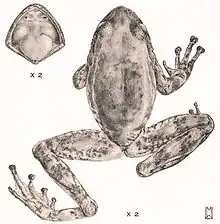Cryptobatrachus
Cryptobatrachus is a genus of frogs in the family Hemiphractidae. They are found in Colombia and Venezuela.[1][2] They are also known as backpack frogs,[1] as the females have the habit of carrying their egg clutch on their backs until the young hatch; this behavior also occurs in the related hemiphractid genera Hemiphractus and Stefania.[3][4]
| Cryptobatrachus | |
|---|---|
 | |
| Cryptobatrachus boulengeri | |
| Scientific classification | |
| Domain: | Eukaryota |
| Kingdom: | Animalia |
| Phylum: | Chordata |
| Class: | Amphibia |
| Order: | Anura |
| Family: | Hemiphractidae |
| Genus: | Cryptobatrachus Ruthven, 1916 |
| Type species | |
| Cryptobatrachus boulengeri Ruthven, 1916 | |
| Species | |
|
6 species (see text) | |
Description
Cryptobatrachus have a treefrog-like habitus.[3] Males measure 27–52 mm (1.1–2.0 in) and females 48–75 mm (1.9–3.0 in) in snout–vent length.[2] Fingers have no webbing whereas the toes are webbed. The finger and toe tips bear disks that are larger on the former.[5] Also adhesive pads are present on the penultimate subarticular tubercles on the fingers.[2][5] Males lack vocal sac[2] and these frogs appear not to vocalize.[5]
Species
There are six species in the genus Cryptobatrachus:[1][2]
- Cryptobatrachus boulengeri Ruthven, 1916
- Cryptobatrachus conditus Lynch, 2008[5]
- Cryptobatrachus fuhrmanni (Peracca, 1914)
- Cryptobatrachus pedroruizi Lynch, 2008[5]
- Cryptobatrachus remotus Infante-Rivero, Rojas-Runjaic, and Barrio-Amorós, 2009
- Cryptobatrachus ruthveni Lynch, 2008[5]
The AmphibiaWeb lists the six species above, but also Cryptobatrachus nicefori,[6] which the Amphibian Species of the World places in the hylid subfamily Cophomantinae as "Hyla" nicefori, indicating uncertain generic affiliation.[7]
Habitat and ecology
Cryptobatrachus occur on humid forested slopes in the mountain ranges of northern Colombia and northeast Venezuela at elevations of 360–2,400 m (1,180–7,870 ft) above sea level. They are nocturnal and perch on low bushes or cling to rocks and cliffs in spray zones of waterfalls.
References
- Frost, Darrel R. (2021). "Cryptobatrachus Ruthven, 1916". Amphibian Species of the World: An Online Reference. Version 6.1. American Museum of Natural History. doi:10.5531/db.vz.0001. Retrieved 28 April 2021.
- Duellman, William E. (2015). Marsupial Frogs. Gastrotheca and Allied Genera. Baltimore: Johns Hopkins University Press. pp. 108–110. ISBN 978-1-4214-1675-5.
- Vitt, Laurie J. & Caldwell, Janalee P. (2014). Herpetology: An Introductory Biology of Amphibians and Reptiles (4th ed.). Academic Press. p. 497.
- Means, D. Bruce; William E. Duellman & Valerie C. Clark (2008). "Ovipositing behavior in the egg-brooding frog Stefania ayangannae (Anura, Hemiphractidae)". Phyllomedusa. 7 (2): 143–148. doi:10.11606/issn.2316-9079.v7i2p143-148.
- Lynch, John D. (2008). "A taxonomic revision of frogs of the genus Cryptobatrachus (Anura: Hemiphractidae)". Zootaxa. 1883 (1): 28–68. doi:10.11646/zootaxa.1883.1.2.
- "Hemiphractidae". AmphibiaWeb. University of California, Berkeley. 2021. Retrieved 28 April 2021.
- Frost, Darrel R. (2021). ""Hyla" nicefori (Cochran and Goin, 1970)". Amphibian Species of the World: An Online Reference. Version 6.1. American Museum of Natural History. doi:10.5531/db.vz.0001. Retrieved 28 April 2021.